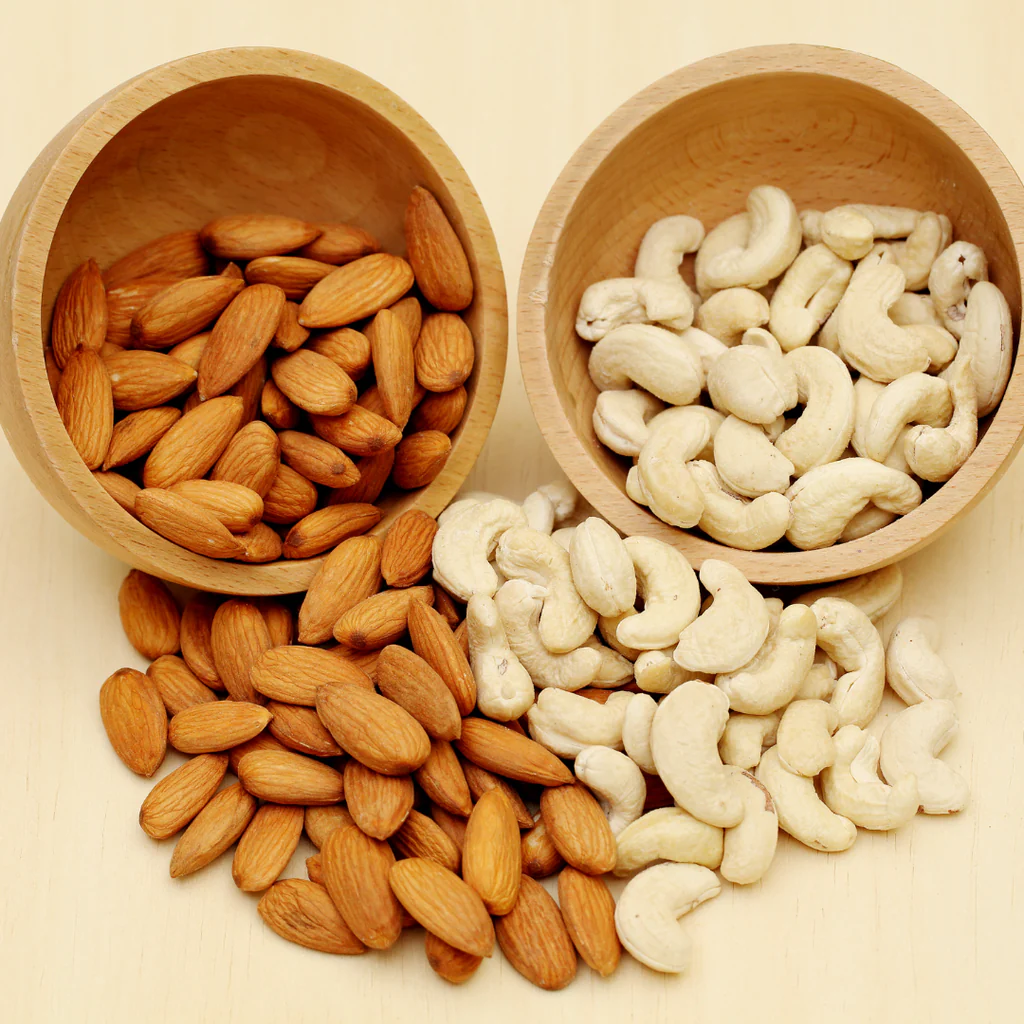Nuts have long been hailed as a go-to snack for health-conscious individuals, and two of the most popular options are almonds and cashews. Not only do these nuts provide a satisfying crunch and rich flavor, but they are also packed with nutrients that offer a variety of health benefits. Whether you’re looking to improve heart health, support weight management, or simply enjoy a delicious snack, almonds and cashews are excellent choices.
In this article, we’ll explore the unique benefits of both almonds and cashews, how they compare, and some tasty ways to enjoy them.
A) Almonds: The Heart-Healthy Supernut
Almonds are often regarded as one of the most nutrient-dense nuts, offering an impressive array of health benefits in a small, convenient package. Here’s why almonds are a superfood you should consider adding to your diet:
Health Benefits of Almonds
Supports Weight Management
Despite being calorie-dense, almonds can actually help with weight management. Their combination of protein, fiber, and healthy fats keeps you feeling full and less likely to snack on unhealthy options.
Rich in Healthy Fats
Almonds are a great source of monounsaturated fats, the kind of fat that is heart-healthy and helps reduce bad cholesterol levels. This, in turn, lowers the risk of heart disease and stroke.
Packed with Protein and Fiber
Almonds are high in protein and fiber, which makes them an excellent snack for staying full and energized throughout the day. A handful of almonds can stave off hunger and keep your metabolism steady.
Loaded with Antioxidants
Almonds contain high amounts of vitamin E, a powerful antioxidant that helps protect cells from damage. This can contribute to improved skin health and support the body’s ability to fight oxidative stress.
Promotes Bone Health
Rich in calcium and magnesium, almonds help support strong bones and teeth, making them a great snack for maintaining bone density, especially as you age.
B) Cashews: The Creamy, Nutrient-Rich Nut
Cashews, with their creamy texture and subtle sweetness, are another popular choice for snacking and cooking. But beyond their delicious flavor, cashews offer a host of nutritional benefits that make them a fantastic addition to a balanced diet.
Health Benefits of Cashews
Aids in Energy Production
Cashews are rich in iron, an important mineral that helps produce energy by carrying oxygen to cells. Including cashews in your diet can help combat fatigue and keep you feeling energized throughout the day.alth Benefits of Dragon Fruit
Good Source of Healthy Fats
Like almonds, cashews are also rich in monounsaturated fats, which promote heart health. These fats help lower bad cholesterol (LDL) while increasing good cholesterol (HDL), contributing to better overall cardiovascular health.
High in Essential Minerals
Cashews are an excellent source of essential minerals like copper, magnesium, and zinc. Copper supports red blood cell production and a healthy immune system, while magnesium plays a key role in nerve function and bone health.
Promotes Brain Health
The nutrients in cashews, particularly the healthy fats and magnesium, support brain function and help maintain cognitive health. These nutrients contribute to better memory, focus, and mood stability.
Supports Eye Health
Cashews contain small amounts of lutein and zeaxanthin, antioxidants that are vital for maintaining healthy vision. These compounds help protect the eyes from harmful UV rays and reduce the risk of age-related macular degeneration.
Almonds vs. Cashews: How Do They Compare?
Both almonds and cashews offer impressive health benefits, but how do they stack up against each other nutritionally? Here’s a quick comparison:
| Nutrient | Almonds | Cashews |
|---|---|---|
| Calories (per 1 oz) | 160 | 157 |
| Protein | 6 grams | 5 grams |
| Fat | 14 grams (mostly healthy fats) | 12 grams (mostly healthy fats) |
| Fiber | 3.5 grams | 1 gram |
| Vitamin E | 37% of the RDI | 1% of the RDI |
| Magnesium | 19% of the RDI | 20% of the RDI |
| Iron | 6% of the RDI | 10% of the RDI |
While almonds have the edge in terms of fiber and vitamin E content, cashews provide more iron and slightly more magnesium. Both are great sources of healthy fats and are relatively low in carbohydrates, making them ideal for a variety of diets, including low-carb and plant-based.
How to Enjoy Almonds and Cashews
Almonds and cashews are incredibly versatile and can be enjoyed in various ways. Here are a few ideas:
Snacks
- Raw or roasted: Enjoy almonds and cashews straight out of the bag as a quick and healthy snack.
- Trail mix: Combine almonds, cashews, and dried fruits for a delicious and energy-boosting trail mix.
- Nut butter: Both almond butter and cashew butter are rich, creamy alternatives to peanut butter, perfect for spreading on toast or adding to smoothies.
Cooking and Baking
- Smoothies: Toss a handful of almonds or cashews into your smoothie for added creaminess and protein.
- Salads: Top your salads with roasted almonds or cashews for a satisfying crunch.
- Baking: Use almond flour for gluten-free baking, or add chopped almonds and cashews to cookies, muffins, and granola.
Plant-Based Alternatives
- Almond milk and cashew milk: Both nuts can be used to make dairy-free milk alternatives that are perfect for coffee, cereal, or baking.
- Cashew cheese: Soaked and blended cashews can be turned into a creamy, dairy-free cheese substitute for vegan dishes.
Final Thoughts
Both almonds and cashews are nutrient-dense nuts that offer a wealth of health benefits. Whether you’re snacking on them raw, using them in recipes, or enjoying them as plant-based alternatives, these nuts are a valuable addition to any healthy diet. With almonds’ high fiber and vitamin E content and cashews’ rich mineral profile, you can’t go wrong by incorporating these supernuts into your daily routine.
So next time you’re looking for a snack, reach for almonds or cashews—your heart, brain, and taste buds will thank you!




